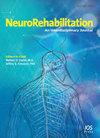求助PDF
{"title":"Swallowing Therapy Effects on Oral Muscle Mass, Tongue Function, Swallowing, and Nutrition in Stroke Patients with Dysphagia.","authors":"Guan-Yi Li, Yu-Chi Huang, Jia-Ying Wu, Chau-Peng Leong, Chung-Hui Cheng","doi":"10.1177/10538135241308773","DOIUrl":null,"url":null,"abstract":"<p><p>BackgroundDysphagia, common post-stroke, elevates clinical risks. Muscle atrophy and compromised function correlate with malnutrition and secondary sarcopenia.ObjectiveWe studied oral muscle thickness, tongue strength/endurance in post-stroke dysphagia (PSD) using sonography and Iowa Oral Performance Instrument (IOPI), and assessed swallowing therapy's impact.Methods17 healthy and 15 PSD participants were analyzed. Healthy subjects underwent baseline sonography and IOPI. PSD patients received a 3-week swallowing therapy including traditional methods, neuromuscular electrical stimulation, and IOPI-guided oral exercises. Pre/post-swallowing therapy sonography and swallowing-related evaluations were conducted.ResutlsPSD group exhibited significant differences in affected masseter muscle thickness (P = 0.001), tongue strength (P ≤ 0.001), but not posterior tongue endurance (P = 0.066). After swallowing therapy, PSD patients showed notable improvement in masseter muscle thickness (P = 0.011) and tongue strength (P = 0.005-0.009). Clinical metrics like Functional Oral Intake Scale (P = 0.004), Mini Nutritional Assessment (P = 0.007), and gait speed (P = 0.018) also improved.ConclusionsStroke-induced dysphagia correlates with reduced masseter muscle thickness, tongue strength, and endurance. Swallowing therapy enhanced masseter muscle thickness and tongue strength, potentially improving swallowing function, nutrition, and gait speed.</p>","PeriodicalId":19717,"journal":{"name":"NeuroRehabilitation","volume":"56 2","pages":"164-174"},"PeriodicalIF":1.8000,"publicationDate":"2025-03-01","publicationTypes":"Journal Article","fieldsOfStudy":null,"isOpenAccess":false,"openAccessPdf":"","citationCount":"0","resultStr":null,"platform":"Semanticscholar","paperid":null,"PeriodicalName":"NeuroRehabilitation","FirstCategoryId":"3","ListUrlMain":"https://doi.org/10.1177/10538135241308773","RegionNum":4,"RegionCategory":"医学","ArticlePicture":[],"TitleCN":null,"AbstractTextCN":null,"PMCID":null,"EPubDate":"2025/2/9 0:00:00","PubModel":"Epub","JCR":"Q3","JCRName":"CLINICAL NEUROLOGY","Score":null,"Total":0}
引用次数: 0
引用
批量引用
Abstract
BackgroundDysphagia, common post-stroke, elevates clinical risks. Muscle atrophy and compromised function correlate with malnutrition and secondary sarcopenia.ObjectiveWe studied oral muscle thickness, tongue strength/endurance in post-stroke dysphagia (PSD) using sonography and Iowa Oral Performance Instrument (IOPI), and assessed swallowing therapy's impact.Methods17 healthy and 15 PSD participants were analyzed. Healthy subjects underwent baseline sonography and IOPI. PSD patients received a 3-week swallowing therapy including traditional methods, neuromuscular electrical stimulation, and IOPI-guided oral exercises. Pre/post-swallowing therapy sonography and swallowing-related evaluations were conducted.ResutlsPSD group exhibited significant differences in affected masseter muscle thickness (P = 0.001), tongue strength (P ≤ 0.001), but not posterior tongue endurance (P = 0.066). After swallowing therapy, PSD patients showed notable improvement in masseter muscle thickness (P = 0.011) and tongue strength (P = 0.005-0.009). Clinical metrics like Functional Oral Intake Scale (P = 0.004), Mini Nutritional Assessment (P = 0.007), and gait speed (P = 0.018) also improved.ConclusionsStroke-induced dysphagia correlates with reduced masseter muscle thickness, tongue strength, and endurance. Swallowing therapy enhanced masseter muscle thickness and tongue strength, potentially improving swallowing function, nutrition, and gait speed.
吞咽治疗对脑卒中伴吞咽困难患者口腔肌肉质量、舌功能、吞咽和营养的影响。
背景:吞咽困难是卒中后常见的症状,可增加临床风险。肌肉萎缩和功能受损与营养不良和继发性肌肉减少症有关。目的应用超声和IOPI技术研究脑卒中后吞咽困难(PSD)患者的口腔肌肉厚度、舌头力量/耐力,并评估吞咽治疗的影响。方法对17例健康患者和15例PSD患者进行分析。健康受试者接受基线超声和IOPI检查。PSD患者接受为期3周的吞咽治疗,包括传统方法、神经肌肉电刺激和iopi引导下的口腔练习。吞咽治疗前后进行超声检查和吞咽相关评估。结果spsd组在咬肌厚度(P = 0.001)、舌力(P≤0.001)、舌后耐力(P = 0.066)上无显著差异。吞咽治疗后,PSD患者的咬肌厚度(P = 0.011)和舌力(P = 0.005 ~ 0.009)均有显著改善。临床指标如功能性口服摄入量表(P = 0.004)、迷你营养评估(P = 0.007)和步态速度(P = 0.018)也有所改善。结论卒中性吞咽困难与咬肌厚度、舌力和耐力降低有关。吞咽治疗增强了咬肌的厚度和舌头的力量,潜在地改善了吞咽功能、营养和步态速度。
本文章由计算机程序翻译,如有差异,请以英文原文为准。

 求助内容:
求助内容: 应助结果提醒方式:
应助结果提醒方式:


